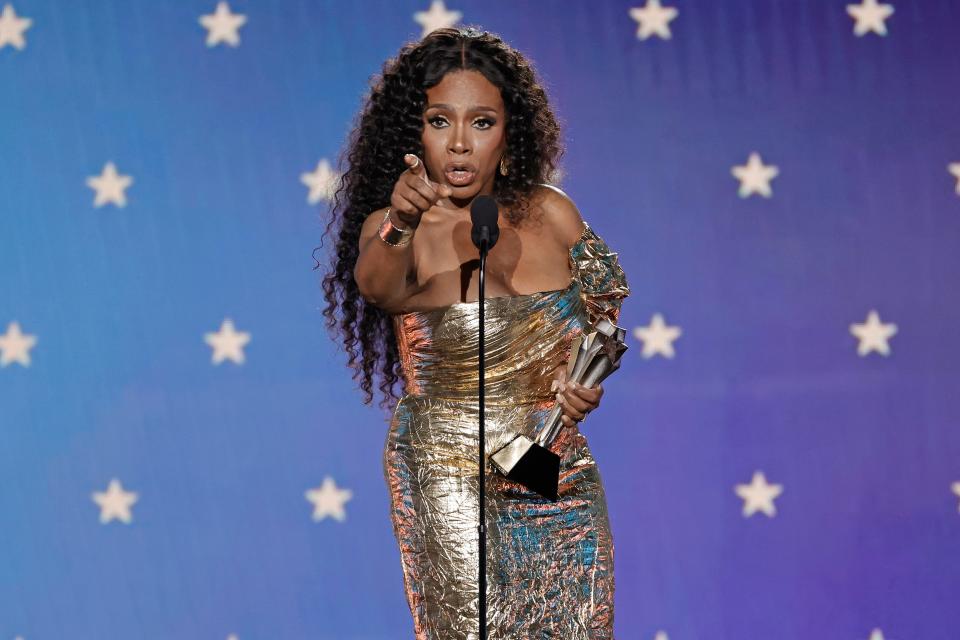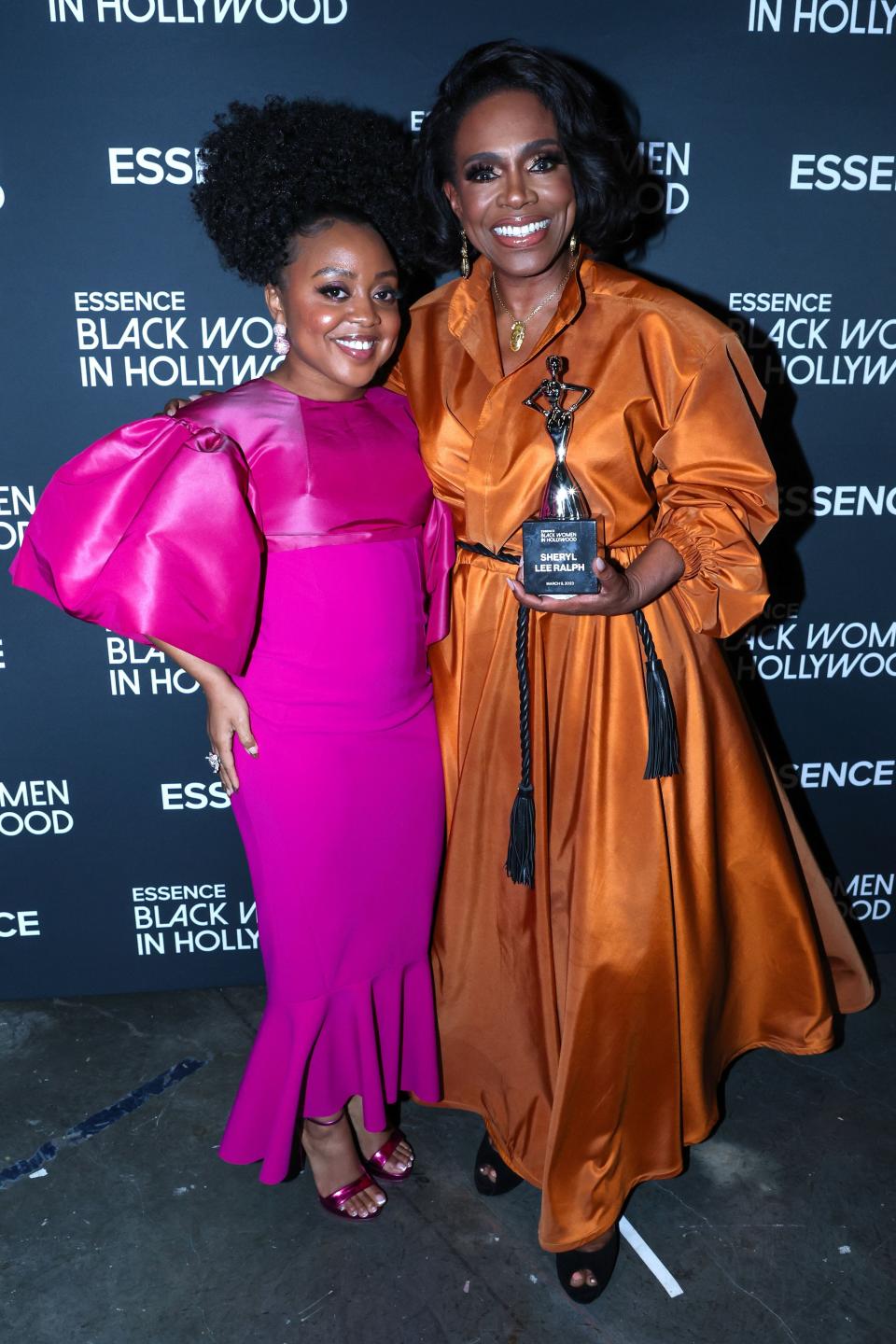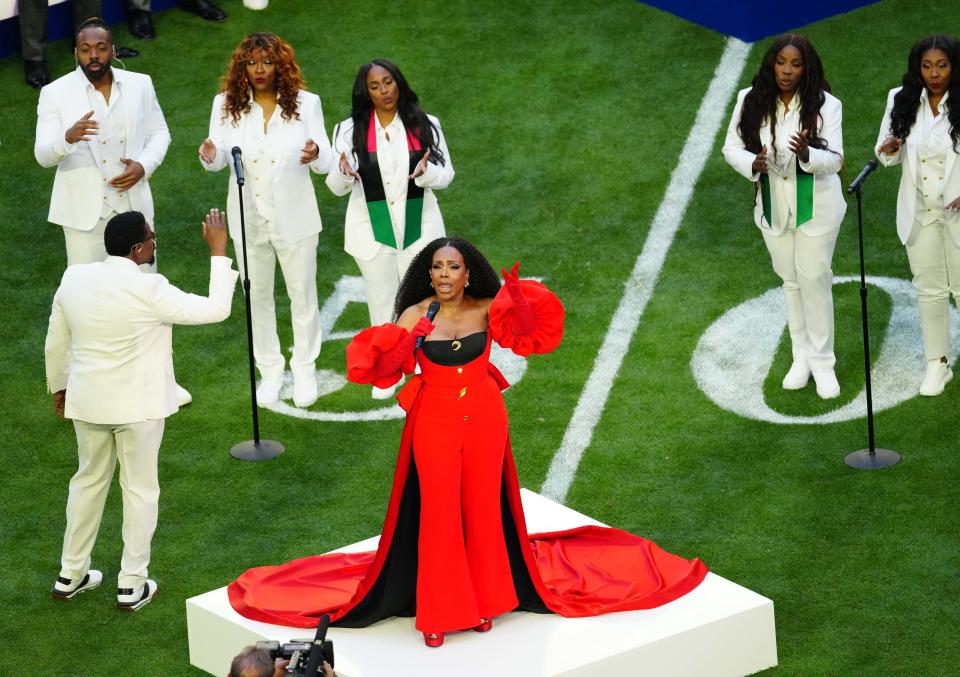For Sheryl Lee Ralph of 'Abbott Elementary' fame, success is having a voice – and being heard
There have been many moments, many years, when Sheryl Lee Ralph didn't feel seen or heard.
Even before Ralph made her way onto screens big and small, before she waited in the wings to take the stage on Broadway, she had to fight to have a voice, to be respected.
She recalls attending Notre Dame Academy in Waterbury, Connecticut, where she lived with her family before splitting their time between Long Island, New York and Mandeville, Jamaica. She was the only Black girl in the school.
A teacher, a nun, a so-called woman of God, chastised her for not practicing piano. "I don't have to take students like you," she told Ralph before slamming the lid of the piano, narrowly missing Ralph's hands.
Students like you.
"She was just going to break my fingers – my fourth-grade fingers," Ralph told me.
At home, Ralph watched on television as dogs were released on kids who looked like her and were not much older than her. She watched the images of college-aged civil rights freedom fighters being murdered. She watched when Martin Luther King Jr., Malcolm X, John F. Kennedy and Robert Kennedy were all fatally shot in the head.

"I often tell people I do not look like my journey," Ralph said. "I'm a child of the '60s. And the '60s were a very difficult, ugly time in America. A time when people did not respect the youth of a Black child or a Black person, period."
I had the pleasure of interviewing Ralph as part of the USA TODAY Women of the Year project. You can read our question-and-answer section here. But I found her so captivating, I wanted to tell you a little bit more about her.
She is that special. She said things to me both off camera and on that I will carry with me for the rest of my life. She offered me advice as a Black woman, as a Black journalist. She told me to keep pursuing my dreams.
Women of the Year: Sheryl Lee Ralph embraces height of her career
Big roles, gone, then reclaimed
Ralph's current role requires her to wear sweater sets and a gaudy cellphone carrier around her neck – modern teacher gear. (More on that later.) But in the 1980s, Ralph donned glamorous gowns and sang her heart out in the character who put her on the map: Denna Jones.
Ralph played the part of Jones in the original 1981 Broadway musical production of "Dreamgirls" alongside Jennifer Holliday and Loretta Devine. The women portrayed a Supremes-esque girl group trying to navigate stardom and a manager who took financial advantage of them.
Black families traveled to New York from everywhere, often for the first time, to experience Broadway, to watch people who looked like them on America's biggest stage. In 1982, Ralph was nominated for a Tony Award, which recognizes excellence in live Broadway theater, for her performance. In 2006, the musical would be transformed into a hit film starring Beyoncé, Jennifer Hudson, Eddie Murphy and Jamie Foxx.
"Creating the role of Deena Jones in "Dreamgirls" was not just a gift to me, but it was a gift to a whole lot of little girls, little Black girls who came to the theater, sat in that audience, looked up on the stage and saw a beautiful big girl image of themselves," she told me.

Once "Dreamgirls" went dark in 1985, many members of the company became brutally ill with a deadly chronic condition. Ralph was overwhelmed by loss. Her friends and colleagues were dying. She had to do something.
So she founded the D.I.V.A. Foundation (Divinely Inspired, Victoriously Aware) in 1990 as a memorial to her many friends who succumbed to HIV/AIDS during and after "Dreamgirls." The nonprofit organization uses music and entertainment as a vehicle to bring awareness and erase the stigma attached to HIV/AIDS.
DIVAS Simply Singing!, an annual fundraising event, is the longest consecutive running musical AIDS benefit in the United States.
"I don't think I'd be anything if I were not an activist," Ralph said. "I don't think I would be anything if I were not using my voice to help right wrongs the way that I could. ... You see, I've been unmuted. My screen is not fuzzy anymore. I'm coming through loud and clear."
Ralph, 66, has shared screen time with heavyweights such as Sidney Poitier, Robert De Niro and Denzel Washington. Her career seemed to peak in the late 1990s, when she played Brandy's stepmother in the iconic sitcom "Moesha."
Ralph was a mainstay in Hollywood. Until she wasn't. Her film and television credits are endless. But work dried up some in the 2000s, and she was reduced to taking mostly bit roles here and there and she considered leaving the industry.
"There have been moments where I thought, 'Well, if I quit now I have had a great career.' No one could say that that wasn't true," she said. "But I didn't quit. I kept moving on. I kept believing."
Becoming Barbara Howard
She was still believing on the day she was walking with her daughter across a television lot in Los Angeles. They encountered another woman also in stride.
"You've got to meet her, Mom," Ralph's daughter told her. "She's going to be somebody."
That woman was Quinta Brunson, a rising star.
The world didn't know it yet, but there was a TV show waiting to be made, a mockumentary sitcom inspired by Brunson's own youth. It would be about an underfunded Philadelphia public school in a mostly Black neighborhood, inspired by two teachers she had known growing up.

A few years later, Brunson called Ralph. Hollywood was sleeping on her career, Brunson said, but she was not. That show idea was now a pilot. And it was close to being picked up by a network.
Brunson wanted Ralph to play a kindergarten teacher, based on one of those characters from her youth: her own mother, who taught for 40 years.
Now, Brunson is the creator, writer, executive producer and star of one of TV's biggest shows, "Abbott Elementary."
And Ralph is Barbara Howard. As a longtime kindergarten teacher, she’s seen enough to give her newer colleagues a healthy dose of realism. “My kids don’t have half the supplies they need most of the time,” she lectures Brunson’s character in an early episode, “but they don’t need to know that.”
I can understand how Brunson might have found the contours of Abbott and Barbara Howard within her own childhood. Having a mother as a teacher is something impossible to escape. My mother was a teacher in Toledo Public Schools for 35 years. I vividly remember grocery shopping with mom and we'd run into her former students or students' parents at Kroger. Their gratitude for my mom's work always moved me, even sometimes surprised me. I imagine how she served as a mentor to younger colleagues.
So for me, though Abbott is a fictional school, that kind of guidance feels very real. As the newer teachers at Abbott learn the ropes, they find the most valuable feedback in their world is Mrs. Howard’s quiet nod of approval.
Ralph got her nod of approval, too. She’s now an Emmy-winner for her role as Howard, only the second Black woman to win for supporting actress in a comedy. She and her colleagues won a Screen Actors Guild Award.
Ralph says she originally believed she should have played the principal instead of the kindergarten teacher. “Absolutely not,” she says Brunson told her. “We need a queen for Barbara Howard, and you are that queen."
Now, that queen is being heard. Unmuted.
The voice everyone could hear
It was her voice that millions around the world heard on Super Bowl Sunday, when she performed "Lift Every Voice and Sing," known as the unofficial Black national anthem. She went into the performance with intention, discussing with musical director Adam Blackstone her desire to uplift the country, particularly now.
"I want people to really hear the song," Ralph said she told him. "I want them to hear the words. And I want them to realize that all of our march toward freedom, toward humanity toward liberty, and justice, all of us, not just Black people, all of us together. I want them to hear that, and I want people to come together knowing that we can do this, we can be better for the whole nation."

America, too, is a fickle character. Conservatives lambasted the NFL for its perceived divisiveness. Ralph chose to ignore the backlash. She chose to soar, not crash into the valley of bitterness.
"It was so interesting to know that people knew so little about the song," she told me. “People thought that it was a song just for Black people. No, it was a song for all people written to commemorate the birthday of Abraham Lincoln, a song that was written to empower a newly free people in America to let them know that they too, are part of the American Dream.” That they belong. It's so interesting how you can do something for the good of all. And there can be those that can say, 'but it's not for me.' When in fact, it is for all of us. It's for all of us to rise up together in pursuit of liberty and justice – for all. There's nothing more American than that."
It's about being open. Ralph advises everybody – particularly women – to be open to change, be open to others, to learning, growing, healing. It's how she's chosen to navigate her career, the roles she accepts, the way she treats her colleagues, the decisions to say 'yes' even when she's apprehensive.

She knows her worth, but sometimes she wants to hear it. Or hear nothing at all.
"On Super Bowl Sunday, when you're talking about an audience of well over 100 million people, and in the stadium alone, about 70,000 people – oh, my God," she said. "When I walked out onto that stage, center stage, which is my home, on the 50 yard line. And you can hear the noise that 70,000 people will make. And then I started singing and it got quiet. And I was like, Oh my God, what's happening? And then when it was over, they burst into applause. I was like, yes, thank you, God. I just had to stand there and take it all in."
Seen. And heard.
Suzette Hackney is a national columnist. Reach her on Twitter: @suzyscribe.
This article originally appeared on USA TODAY: For Sheryl Lee Ralph of 'Abbott Elementary,' time to lift every voice

 Yahoo Movies
Yahoo Movies 
